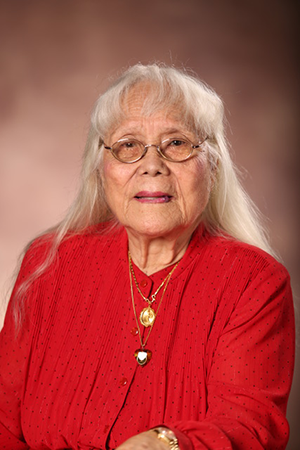Lost family members but found her faith

The encroachment of the Second World War in the Pacific forever changed the lives of the CHamorus. Within the first few days of Japanese occupation, Ana Sablan Palomo (1927 – ) lost many members of her family, but found her faith.
At the time, she remembers her family housing Father Jesus Baza Duenas in their Piti home, and by a stroke of fate, he was there when she needed him most.
He should be a saint. He was the one who made me strong.
Ana Sablan Palomo
Two days after the bombing of Hagåtña, at 4 am on 10 December, a group of 13 CHamorus tried to flee to Yigo, but were ambushed by Japanese soldiers. Among those known to be killed were Palomo’s oldest brother Vicente Santos Sablan and her mother, Nicolasa Camacho Santos Sablan, as well as Ana Limtiaco Blas, Juan Limtiaco Blas, Rosa Aflague Limtiaco, Jesus Mendiola Metsumiya, Jose Mendiola Metsumiya, Josefina Mendiola Metsumiya, Tomas Mendiola Metsumiya, Joaquin Limtiaco San Nicolas, Jose Limtiaco San Nicolas, Maria Limtiaco San Nicolas, and Rosa Barcinas Yamanaka.
Only the driver, Felix “Sakai” Flores survived long enough to tell Palomo how her mother and brother were brutally bayonetted. Stricken by grief, 14-year-old Palomo could not control her tears days later when she stared another platoon of soldiers in the face.
I was crying, because my mother was killed, so Father Duenas saw me crying, and the Japanese they were going to kill me, but the priest Father Duenas pulled me to the side. ‘Stop crying,’ he said because it means my mother and brother are in heaven. So I was saved.
Now, many decades later, she still remembers the priest’s words like a prayer whenever she experiences loss.
When my sister died, or anybody dies in the family, I don’t cry. You’re holding them back, when your mother dies, you’re holding back her spirit from entering heaven.
While many young teachers were employed in a school and spared the harshest treatment during occupation, Palomo was turned away.
I didn’t go to the Japanese school. I had blond hair so they called me ‘American Ona.’ So you know, I didn’t go to school, the Lord took care of me.
Worked in the rice fields
Instead, Palomo went to work in the rice fields. Through the long days of hard work and little food, she still remembers small moments of peace.
Working in the rice field, when we want to rest they play the phonograph and I dance the hula, and then the Japanese calls ‘yasumi,’ so we can rest. ‘Yasumi’ means to rest.
Around their camp, Palomo heard stories of young women being taken against their will and raped by their captors. Once when Palomo was cornered by a soldier with ill-intent, she was warned by another that one of the Japanese soldiers was going to rape her. He told her to run and she did. She thanked the blessed mother for protecting her.
While working in the rice field, she experienced one of the greatest blessings of her life when, amongst the rice shoots and muddy water, she found something quite expected.
You know our statue in Piti, the Assumption of Our Lady? That was found at the rice field at the Japanese occupation of Guam.
Palomo said when her family was taken to the Asinan concentration camp in Yoña, they put the statue on a table. Palomo believes the statue came from a Spanish Galleon and years later hired Dave Dela Sola to refurbish the statue, unveiling from the dirt, a chorus of angels and flowers carved around the base.
Husband used his wit to survive
Joaquin “Ding” Palomo, whom Palomo later met while teaching and married, survived by his own wit.
When the Japanese took him, he pretended to poo poo, so the Japanese told him to go away, they don’t want to smell it, and that’s how he escaped.
The group Ding marched with that day was killed shortly down the road and only he got away.
After the war, Palomo resumed teaching while she and Ding had six children: Dorothy, Maryanne, Sheila, Geraldine, Joseph, and Patrick, an accomplished jazz musician.
A strict, but loving mother, Palomo said CHamorus used to be a lot stricter with their kids to show their love.
Though her faith is strong, Palomo loses sleep when she gets to thinking about the war. Not only do these memories keep her awake, but she becomes angry when thinking about the aftermath of the war.
I don’t honor the Liberation. My father, Enrique Castro Sablan, was in the military. He retired, and then he was commissioner of Piti. He died in 1936. I used to go to the commissary, but when my mother was killed and my brother, they didn’t want me to go to the commissary after that. I was only 16. That’s why I don’t honor, and then we’re not paid for the war reparations. It’s the US responsibility to pay us and they don’t. It’s sad.
A well-known accordion and piano-player in her day, Palomo owns land in Guam, Hawai’i, and California.
For whoever needs to be sheltered. That’s me, I shelter people. That’s me, they don’t have a place, go ahead, and I’m paying for that. See, the more you give, the more you get.
Editor’s note: Reprinted and adapted, with permission, from Guam War Survivors Memorial Foundation by Amanda Pampuro.
